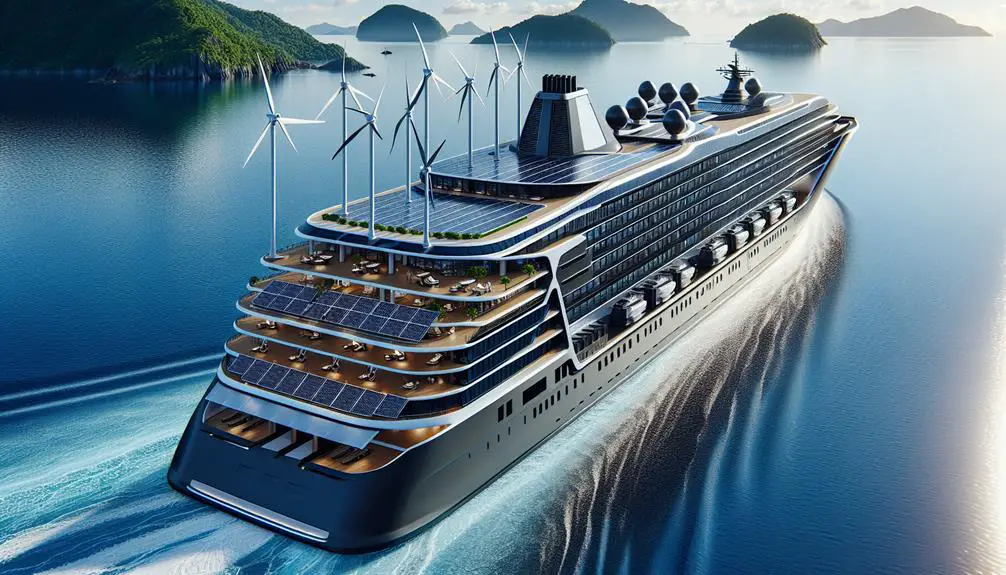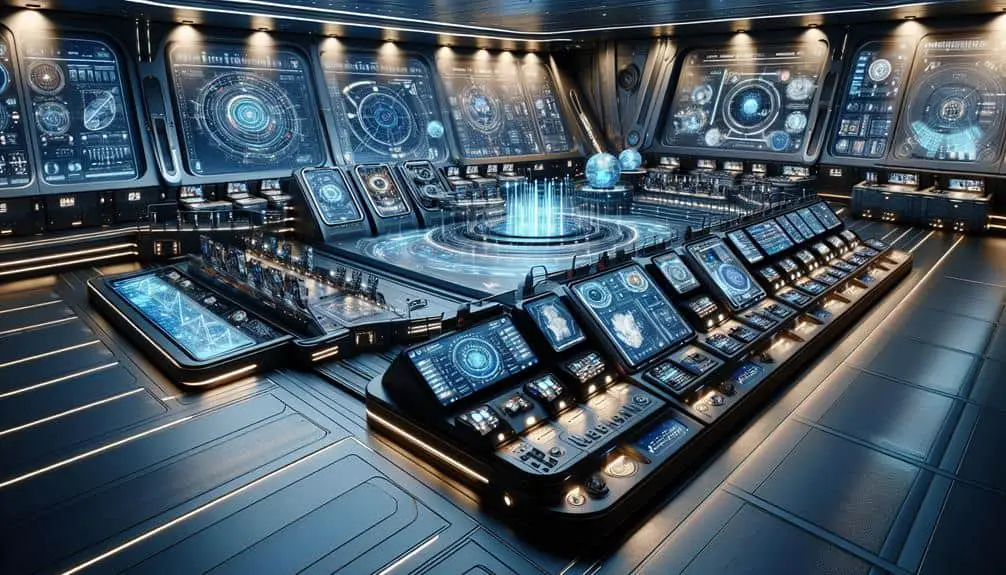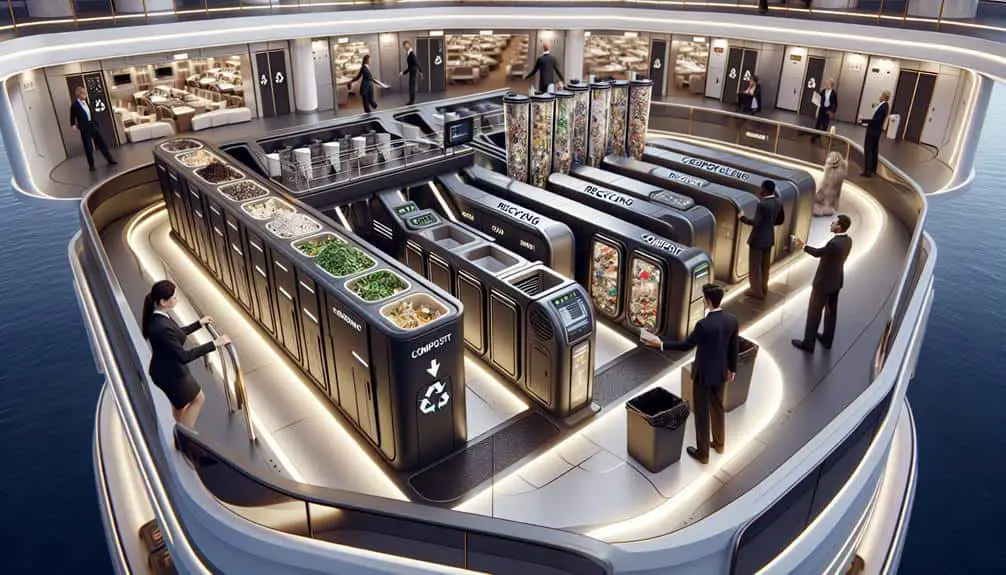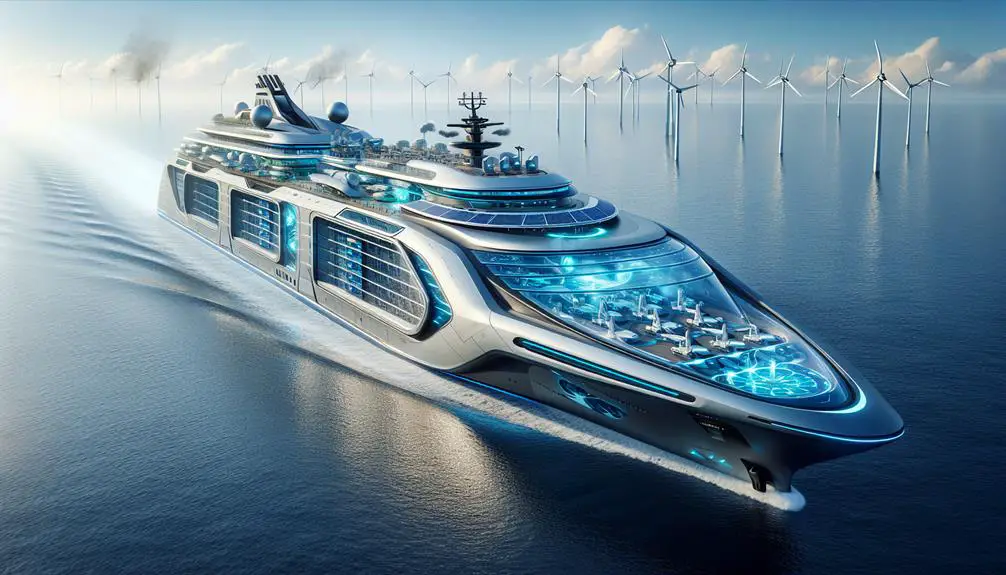Cruise ships are turning to green energy to cut harmful emissions, save money, and comply with tough environmental rules amidst growing climate change worries. Embracing renewable alternatives like LNG and hydrogen fuel cells lessens the impact of traditional fuels, decreasing carbon footprints and attracting eco-conscious passengers. Hydrogen fuel cells offer high energy efficiency and zero emissions, while shore power connections reduce pollution. Tech innovations like solar panels, battery storage, and hybrid propulsion systems improve energy efficiency. Future trends show a shift towards solar, wind, and advanced propulsion systems. Green energy adoption is shaping a cleaner, more sustainable future for cruise ships.
Key Points
- Reduce harmful emissions and carbon footprint
- Cost savings by reducing traditional fuel use
- Meet environmental regulations and enhance reputation
- Utilize renewable energy sources for sustainability
- Improve air and water quality with cleaner energy
Environmental Impact of Traditional Fuels
The combustion of traditional fuels on cruise ships poses a substantial environmental threat due to the release of harmful emissions into the atmosphere. These emissions contribute to the ships' overall carbon footprint, exacerbating climate change and air quality issues. To combat this, the maritime industry is increasingly turning to renewable alternatives to power their vessels.
Renewable alternatives such as liquefied natural gas (LNG), hydrogen fuel cells, and even wind propulsion systems are being explored as viable options to reduce the environmental impact of cruise ships. LNG, for example, produces considerably fewer emissions compared to traditional marine diesel, thereby lowering the overall carbon footprint of these vessels. Hydrogen fuel cells offer another promising solution by generating electricity through a chemical reaction between hydrogen and oxygen, producing only water and heat as byproducts.
Benefits of Green Energy Adoption
Incorporating green energy solutions into cruise ship operations enhances efficiency and reduces environmental impact to a great extent. By adopting sustainable energy practices, cruise lines can achieve significant benefits:
- Cost Savings: Green energy solutions such as solar panels and wind turbines can lead to substantial cost savings in the long run by reducing the reliance on traditional fuels that are subject to price fluctuations.
- Emission Reduction: Green energy adoption results in a substantial decrease in harmful emissions such as sulfur oxides, nitrogen oxides, and particulate matter, contributing to cleaner air and water environments.
- Enhanced Reputation: Embracing green energy portrays cruise lines as environmentally responsible entities, attracting eco-conscious passengers and enhancing the company's reputation.
- Regulatory Compliance: Green energy adoption helps cruise lines meet and exceed stringent environmental regulations, avoiding penalties and ensuring sustainable operations for the future.
Sustainable Energy Sources for Cruises
Utilizing advanced technologies like hydrogen fuel cells and shore power connections can greatly enhance the sustainability of energy sources for cruises. When considering renewable alternatives for cruise ships, hydrogen fuel cells stand out due to their high energy efficiency and zero-emission characteristics. These fuel cells generate electricity through a chemical reaction between hydrogen and oxygen, producing only water as a byproduct. By integrating hydrogen fuel cells into the ship's power system, cruise operators can markedly reduce their environmental impact while ensuring a reliable power source for onboard operations.
Furthermore, shore power connections enable cruise ships to plug into local electrical grids while docked, eliminating the need to run onboard generators continuously. This not only reduces emissions but also minimizes noise pollution in port areas. By utilizing a combination of renewable energy sources and energy-efficient technologies, cruise ships can navigate the seas with a reduced carbon footprint, contributing to a more sustainable maritime industry.
Technological Innovations in Cruise Industry
To revolutionize the cruise industry and propel it towards a sustainable future, embracing cutting-edge technological innovations is paramount. Cruise lines are integrating advanced technologies to reduce their environmental footprint and enhance energy efficiency.
Here are some key technological innovations reshaping the cruise industry:
- Installation of Solar Panels: Cruise ships are increasingly equipping their decks with solar panels to harness the power of the sun. These panels convert sunlight into electricity, providing a renewable energy source that can supplement traditional power generation methods.
- Implementation of Battery Storage Systems: Battery storage systems are being adopted to store excess energy generated from sources like solar panels. This stored energy can then be used during peak times or when the ship is unable to generate sufficient power, reducing reliance on fossil fuels.
- Smart Energy Management Systems: Cruise lines are deploying sophisticated energy management systems to optimize power usage on board. These systems monitor energy consumption in real-time and adjust settings to minimize waste, leading to greater efficiency.
- Hybrid Propulsion Systems: Some cruise ships are incorporating hybrid propulsion systems that combine traditional fuel engines with electric propulsion. This hybrid approach reduces emissions and fuel consumption, contributing to a more sustainable cruising experience.
Future Trends in Cruise Ship Energy
Future cruise ship energy trends are poised to revolutionize the industry's sustainability efforts with groundbreaking advancements in power generation and propulsion systems. The future of cruise ship energy lies in renewable solutions and efficiency improvements. Cruise lines are increasingly turning to renewable energy sources such as solar, wind, and even hydrogen fuel cells to power their vessels. These technologies offer a cleaner and more sustainable alternative to traditional fossil fuels, reducing greenhouse gas emissions and environmental impact.
Efficiency improvements are also at the forefront of future cruise ship energy trends. Advanced propulsion systems, like LNG-powered engines and hybrid electric propulsion, are being developed to enhance fuel efficiency and reduce carbon footprint. Additionally, energy management systems and waste heat recovery technologies are being implemented to optimize energy usage onboard, further reducing the environmental footprint of cruise ships.
Frequently Asked Questions
How Do Cruise Ships Dispose of Waste Materials Generated From Green Energy Sources?
When cruise ships implement green energy sources, waste management becomes essential. Recycling processes are key in handling waste materials generated. Proper disposal methods are vital to guarantee sustainability and minimize environmental impact.
Are There Any Challenges in Implementing Green Energy Solutions on Older Cruise Ships?
Implementing green energy solutions on older cruise ships can pose significant challenges. Cost implications and retrofitting challenges are formidable. However, with determination and innovation, these obstacles can be overcome to guarantee sustainable practices at sea.
How Do Green Energy Solutions Impact the Overall Cost of Operating a Cruise Ship?
Implementing green energy solutions on cruise ships can enhance cost efficiency by reducing fuel consumption and maintenance expenses. These initiatives also mitigate the environmental impact, aligning with regulations and improving sustainability practices in the industry.
What Are the Potential Environmental Risks Associated With the Transition to Green Energy in the Cruise Industry?
When shifting to green energy, potential environmental risks in the cruise industry include the disposal of old fuel systems, sourcing sustainable materials for new technologies, and ensuring that sustainability measures don't compromise safety standards.
How Do Cruise Ships Ensure the Reliability and Efficiency of Green Energy Sources While at Sea?
Ensuring the reliability and efficiency of green energy sources while at sea is vital for cruise ships. Energy storage solutions and advanced power generation systems are employed, allowing for uninterrupted operations and reduced environmental impact.




